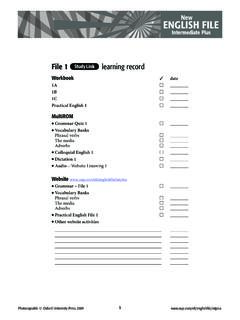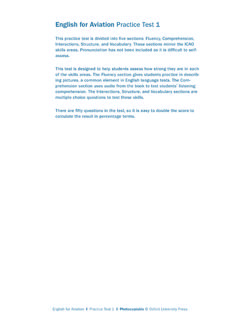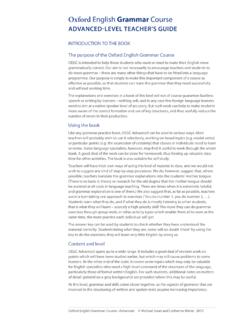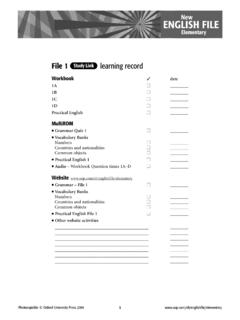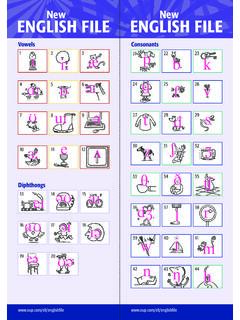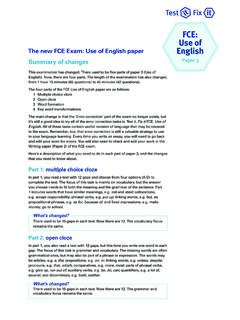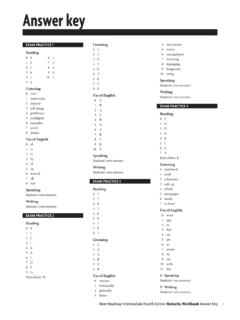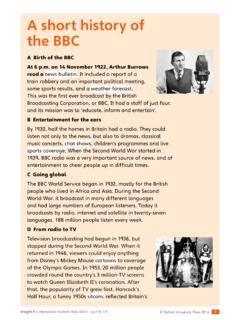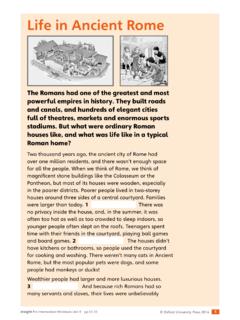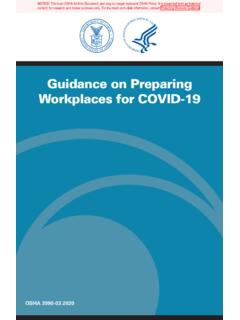Transcription of Word formation - Oxford University Press
1 Copyright Oxford University Press1 Word formation1 CompoundsA Compound nounsA compound noun can be formed by joining two nouns together, hand + bag = handbag. a handbag the weekend football a guidebook my bedroomWe stress the first part of the word: a is little difference between a compound noun and two separate nouns used one after the other, a phone bill. Some combinations can be written either as a compound or as two separate nouns, guidebook or guide book . Some compound nouns are formed from an adjective + noun or from a verb + noun.
2 A greenhouse a blackboard some workmen a searchlightNOTEC ompare these noun: a hotplate (= a place on a cooker where you heat food)Adjective + noun: a hot plate (= a plate which is hot)B Gerund + nounWe can use a gerund to classify a noun, to say what type it is or what its purpose is. the dining-room (= the room for dining in) a washing-machine (= a machine that washes clothes) a sailing-ship some writing-paper a swimming-pool the booking officeWe often use a hyphen after the gerund. We stress the gerund, the a gerund and a : a sleeping-pill (= a pill that helps you to sleep)Participle: a sleeping child (= a child who is sleeping)C Noun + gerundWe can form a compound with a noun + gerund.
3 Taxi-driving was what I ended up doing. We had three days of sightseeing. Coin-collecting is an interesting stress the noun, coin noun in this pattern is singular, coin-collecting. But after a gerund the noun can be either singular or plural depending on the Oxford University Press2 Driving a taxi was what I ended up doing. Collecting coins is an interesting hobby. D Compound modifiersWe can use a number + noun to modify another noun. a three-day visit a sixty-mile journey a car with four-wheel driveThe noun in this pattern is usually singular, a three-day modifier can also be a number + noun + adjective.
4 A three-day-old baby a hundred-metre-long queueWe can also form compounds with participles. a road-widening scheme a hard-boiled egg2 PrefixesA A prefix is something that we can put at the beginning of a word to change the meaning. Compare these two sentences. I calculated the amount I would need. I miscalculated the amount I would need. (= I wrongly calculated the amount I would need.)Here the prefix mis- (= wrongly) changes the Here are some prefixes and some examples of words we can form with (= against) anti-nuclear protestors, anti-social behaviourauto- (= self ) an autobiography, auto-suggestionco- (= together) co-exist, a co-production, my co-driverex- (= previously) his ex-wife, an ex-footballerinter- (= between) an inter-city train, an international phone callmini- (= small) a minibus, a minicabmis- (= badly/wrongly) misuse, misbehave, miscount, a misprintmono- (= one)
5 A monorail, monolingual, speak in a monotonemulti- (= many) a multinational company, a multi-storey car parkout- (= more/better) outnumber the opposition, outplayed their opponentsover- (= too much) overweight, an overgrown garden, ill from overworkpost- (= after) the post-war years, a post-dated chequepre- (= before) the pre-war years, preheat an ovenpro- (= in favour of ) pro-government forces, pro-European policiesre- (= again) re-write a letter, remarry, the resale value of the carsemi- (= half ) semi-precious stones, reach the semi-finalsub- (= under/less) the subway, subnormal intelligence, sub-zero temperaturessuper- (= big/more) a superstar, a superhuman effort, a supersonic aircraftCopyright Oxford University Press3trans- (= across) a transatlantic flight, a heart transplant operationunder- (= too little) undercooked food, an underused resource, underpopulationNOTEOut- and under- can have a literal meaning: underwear, the Underground, underline a word.
6 An outbuilding, an outdoor pool, the outskirts of the There are some negative prefixes meaning not .un- feeling unhappy, an unfair decision, unhealthy conditions, high unemployment, unplug a machine, unpack a suitcasein- an independent state, an inoffensive remark, the invisible man, an incurable disease, a terrible injusticeil- (+ l) an illegal act, an illogical argumentim- (+ b/m/p) an imbalance, an immoral act, immature behaviour, an impossible situation, an impractical dreamer, wait impatientlyir- (+ r) an irrational fear, an irresponsible attitudedis- a dishonest statement, a violent disagreement, disappearing out of the door, a dislike of flyingnon- non-alcoholic drinks, non-stop entertainment, a non-smoking areade- defrost a fridge, the depopulation of the countryside, the decentralization of governmentWe do not use in- before b, l, m, p, or r.
7 We use il-, im-, and ir- SuffixesA IntroductionA suffix comes at the end of a word. For example, we can add the suffix ness to the adjective kind to form the noun kindness. Compare these two sentences. We won t forget how kind you ve been. We won t forget your the use of the suffix to form a noun makes the sentence shorter and the addition of a suffix involves other changes in the form or pronunciation of the word. apply application possible possibility courage / k r d / courageous /k re d s/Copyright Oxford University Press4 Changes in pronunciation can involve both sounds and stress.
8 For example, when we add ous to courage, the stress changes from the first to the second all combinations of words and suffixes are possible. For example, we can add ment to some verbs to form statement, amusement, punishment, and so on. But we cannot add ment to every verb. The possible combinations have to be learned as individual Abstract nounsHere are some ways that we can add a suffix to a verb or adjective to form a noun usually an abstract noun ending in -ion correct correction, discuss discussion produce production, describe description inform information.
9 Invite invitation add addition, repeat repetition decide decision, permit permissionVerb + -ment development, government, movement, paymentVerb + -ance/-ence acceptance, performance; existence, preferenceVerb + -ing a building, my feelingsAdjective + -ness blindness, forgetfulness, illness, sadnessAdjective in ant/ ent distant distance, noun in ance/-ence important importance absent absence, silent silence.
10 Violent violenceAdjective + -ty/-ity certainty, royalty; nationality, stupidityC Driver, student, tourist, are a number of endings that we use to express a person s + -er/-or builder, driver, footballer, interviewer, lawyer, owner, smoker, walker, writer > Note a editor, navigatorNoun/Verb/Adjective + -ist journalist, motorist, nationalist, touristCopyright Oxford University Press5 Verb + -ant/-ent assistant, informant, inhabitant.
